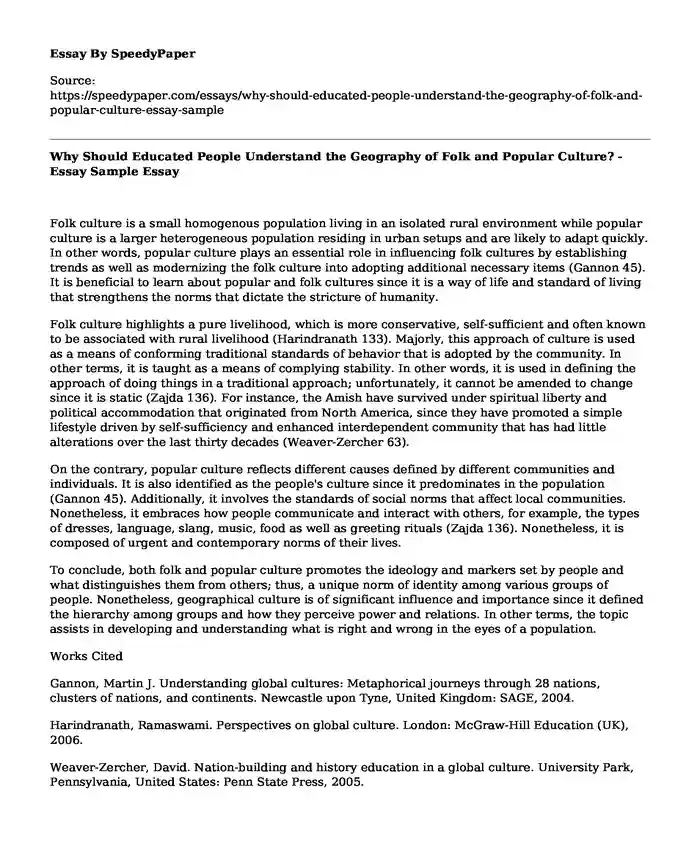Folk culture is a small homogenous population living in an isolated rural environment while popular culture is a larger heterogeneous population residing in urban setups and are likely to adapt quickly. In other words, popular culture plays an essential role in influencing folk cultures by establishing trends as well as modernizing the folk culture into adopting additional necessary items (Gannon 45). It is beneficial to learn about popular and folk cultures since it is a way of life and standard of living that strengthens the norms that dictate the stricture of humanity.
Folk culture highlights a pure livelihood, which is more conservative, self-sufficient and often known to be associated with rural livelihood (Harindranath 133). Majorly, this approach of culture is used as a means of conforming traditional standards of behavior that is adopted by the community. In other terms, it is taught as a means of complying stability. In other words, it is used in defining the approach of doing things in a traditional approach; unfortunately, it cannot be amended to change since it is static (Zajda 136). For instance, the Amish have survived under spiritual liberty and political accommodation that originated from North America, since they have promoted a simple lifestyle driven by self-sufficiency and enhanced interdependent community that has had little alterations over the last thirty decades (Weaver-Zercher 63).
On the contrary, popular culture reflects different causes defined by different communities and individuals. It is also identified as the people's culture since it predominates in the population (Gannon 45). Additionally, it involves the standards of social norms that affect local communities. Nonetheless, it embraces how people communicate and interact with others, for example, the types of dresses, language, slang, music, food as well as greeting rituals (Zajda 136). Nonetheless, it is composed of urgent and contemporary norms of their lives.
To conclude, both folk and popular culture promotes the ideology and markers set by people and what distinguishes them from others; thus, a unique norm of identity among various groups of people. Nonetheless, geographical culture is of significant influence and importance since it defined the hierarchy among groups and how they perceive power and relations. In other terms, the topic assists in developing and understanding what is right and wrong in the eyes of a population.
Works Cited
Gannon, Martin J. Understanding global cultures: Metaphorical journeys through 28 nations, clusters of nations, and continents. Newcastle upon Tyne, United Kingdom: SAGE, 2004.
Harindranath, Ramaswami. Perspectives on global culture. London: McGraw-Hill Education (UK), 2006.
Weaver-Zercher, David. Nation-building and history education in a global culture. University Park, Pennsylvania, United States: Penn State Press, 2005.
Zajda, Joseph. Nation-building and history education in a global culture. Berlin, Germany: Springer, 2015.
Cite this page
Why Should Educated People Understand the Geography of Folk and Popular Culture? - Essay Sample. (2023, Mar 14). Retrieved from https://speedypaper.net/essays/why-should-educated-people-understand-the-geography-of-folk-and-popular-culture-essay-sample
Request Removal
If you are the original author of this essay and no longer wish to have it published on the SpeedyPaper website, please click below to request its removal:
- Samsung - Global Learning Team Case. Free Essay.
- Latin America
- Essay Example on Efficient Markets
- Literary Essay Sample: The Grasshopper and the Bell Cricket
- Museum Site Visit Paper, Free Sample for Your Inspiration
- Essay Example on Family Nurse Practitioner Role
- Free Essay. The Adventures of Huckleberry Finn by Mark Twain
Popular categories





